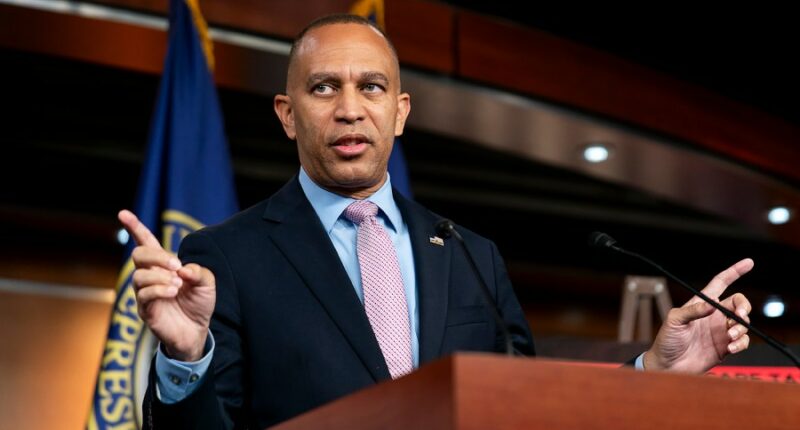Share this @internewscast.com

On Wednesday, House Minority Leader Hakeem Jeffries (D-N.Y.) strongly indicated that Democrats are likely to oppose an extension of existing government funding levels if Republicans propose this approach to prevent a shutdown.
Earlier in March, Jeffries and House Democrats vigorously objected to a funding bill backed solely by Republicans, cautioning that it would jeopardize federal initiatives, particularly affecting low-income individuals.
Reflecting on that opposition, Jeffries noted that simply perpetuating those same funding levels through a continuing resolution (CR) is expected to face similar resistance from Democrats.
“Back in March, House Democrats were firmly against the partisan Republican spending bill that had detrimental effects on everyday Americans, such as increasing their healthcare costs,” Jeffries stated at a Capitol press briefing. “A continuing resolution perpetuating the ineffective policies of the Republican Party, which we previously opposed, is not a solution that truly addresses the needs of the American public.”
These statements came amidst efforts by Speaker Mike Johnson (R-La.) and his team to secure government funding before the fiscal deadline at the month’s end. Lack of action by Congress would lead to a partial government shutdown.
On Tuesday, the Speaker outlined his favored plan, which involves advancing a CR in conjunction with updated allocations for various agencies, including allocations for veterans programs, military construction, the Agriculture Department, and legislative branch funding.
“If we are able to get that conference going, then you would have three bills there,” Johnson told reporters.
Rep. Tom Cole (R-Okla.), the chairman of the House Appropriations Committee, is also pushing that plan.
“We’re not interested in just a CR by itself,” Cole said Tuesday. “I want to move some product as well, to show good faith with our members that we are moving things.”
Still, those additions would do little to address the spending levels for most of the government in the underlying CR, which were the source of the Democrats’ criticism in March and appear likely to drive a similar opposition this month. Party leaders are emphasizing the erosion of health care benefits, in particular, as something they could never support.
“Democrats are prepared to support a bipartisan spending agreement that meets the needs of the American people, in terms of their health, public safety and economic well-being,” Jeffries said. “But we will not support a partisan Republican spending bill that continues to rip away health care from the American people.”
A major part of the health care debate revolves around ObamaCare tax credits that are scheduled to expire at the end of the year. Those subsidies currently benefit more than 22 million patients, whose premiums are expected to skyrocket if Congress doesn’t extend the credits.
Many Democrats think that issue must be addressed this month, since premium rate letters tend to go out in October. That information is likely to influence the decision of patients to sign up for plans — or not — during ObamaCare’s open enrollment period, which launches before the tax credits expire. Jeffries suggested that’s one of the red lines determining Democratic support for a spending bill this month.
“The open enrollment period begins in less than two months. It begins on Nov. 1,” he said. “So this is one of many issues that should be addressed urgently by the United States Congress.”
From the House minority, Jeffries and the Democrats have no power to block the funding legislation if Johnson is able to rally GOP lawmakers behind it. The longer-term question is whether Democrats would also hold the line in the Senate, where they have the power to sink the bill in the form of a filibuster — if they choose to use it.
In March, Senate Minority Leader Charles Schumer (D-N.Y.) infuriated House Democrats when he voted for the Republican-only bill, sending it to the desk of President Trump. This time around the Senate Democratic leader appears to be taking a different tack, at least rhetorically, warning Republicans that a partisan bill is the surest way to a shutdown.












